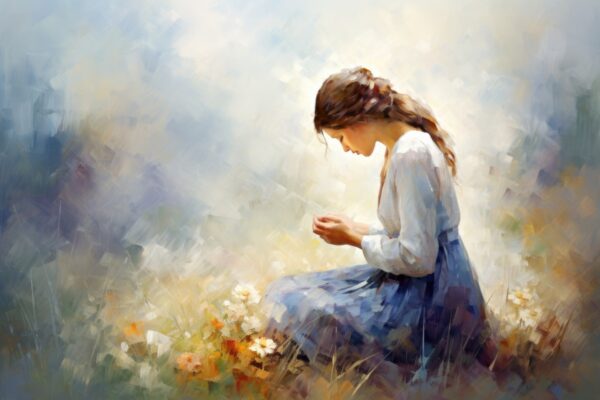“Thou hast made us for thyself, O Lord, and our heart is restless until it rests in thee.”
This quote from St. Augustine finds its way into my life time and again; often when I am work-and-world weary, fatigued in body and spirit. The saint’s words perfectly echo the rest and intimacy with the Lord for which I long.
But knowing these things was different from believing them to be true.
But amid the 9-to-5 workday slog, or even during vacation, in my search for this rest I frequently fall into a vicious cycle: come home, make dinner, laze around, watch Netflix, go to bed. And so often, I feel less rested and just as preoccupied by the impending work.
This problem of the working culture and the false ideal of true rest is the very issue that philosopher Josef Pieper addresses in his short but life-changing essay, “Leisure: The Basis of Culture.” Writing in the 1950s to an audience living in a civilization of total work, Pieper’s words are just as applicable to today’s restless society and to our vocations as Catholic women in this modern world.
It seems a contradiction to think of our non-stop world as idle, but Pieper would define our culture this way. Idleness, Pieper says, is the “deep-seated lack of calm which makes leisure impossible.” Recalling medieval tradition, idleness, or acedia, is one’s refusal to rest in one’s own being and the sadness that comes with failing to accept the divine purpose for which every person is created.
Our culture seems plagued by idleness. The constant industry for its own sake reflects this lack of calm and refusal to accept the challenge of sanctity. The ever-refreshed social media feeds, 24-hour news cycles and on-demand everything makes leisure a rare attitude.
And that is just how Pieper describes leisure: an attitude of the mind and soul that cultivates openness to physical and spiritual realities.
Leisure is seeing things as they are, a celebration “allowing the inner eye to dwell for a while upon the reality of Creation.”
Leisure is an internal condition, one “of inward calm, of silence … letting things happen,” not remaining a passive spectator, but entering into the mystery of self and creation. “It is not simply the result of spare time, a holiday, a weekend or a vacation,” the author writes; a view I so often assume.
Pieper beautifully describes what leisure might look like: When we really let our minds rest contemplatively on a rose in bud, on a child at play, on a divine mystery, we are rested and quickened as though by a dreamless sleep.
The purpose of leisure is “not to be a restorative, a pick me up, whether mental or physical…,” though this can be an effect of leisure. That view values leisure only insofar as it restores one for work. Rather, leisure should be sought because it is good in itself; leisure is resting in our full potentiality and reaching our wholeness, and then seeing all else in that light.
So, how do we get leisure? Pieper states that his essay is merely “an effort to regain some space for true leisure.” He offers little practical advice to reach this point, but only tells us to celebrate.
Celebration is the heart of leisure because it links the reality of the world with the reality of the divine, allowing us to experience the universe “in an aspect other than its everyday one.” We do this particularly in the festival of worship: “The celebration of divine worship, then, is the deepest of the springs by which leisure is fed and continues to be vital.”
Sunday, the holy day of rest, is set aside for leisure in a particular way as the day for worship. Sunday is the day on which God rested from his work of creation and celebrated that “it was very good” (Gen. 1:31). But how often do we view Sunday Mass as an “obligation,” rather than a celebration? How often is church a chore, and the Sunday blues loom with the menacing work week?
Like leisure, done for its own sake, we celebrate the Holy Mass to give worship and thanks to God for his own sake. By its very nature, the celebration of the Mass transports us out of ourselves into God’s time. There, we participate, somehow, in divine mysteries, sing with the hosts of angels and receive into our mortal bodies the Immortal.
Our leisure, then, must be rooted in our Sunday worship, and we must let these deep springs flow into the rest of our days. Rather than being so tied to the work calendar, let us be united to the liturgical calendar, to the holy days and feast days that draw us outside ourselves up into the life of the church, “into an unending holiday … into the heart of the universe,” as Pieper says.
Only when we stop viewing our existence for the sake of work can we begin beholding Sunday as the culmination of our week, and indeed, of our lives. Only when we cease seeking to satisfy our restless hearts with lesser goods and false rest can we find true rest in the heart of the Father.
Leisure is not only the basis of culture, but of our vocations to genuine Catholic femininity. As young women in this hurried world, we desperately need to foster this condition of leisure to maintain and authentically live out our womanhood. Through living (as St. John Paul II said) our “feminine genius”-graces such as receptivity, sensitivity, generosity and maternity-we can nurture the mindset of leisure, which will in turn be nourished by this genius.
As Catholic women, we must remember our lives are primarily centered on Christ, not on the work week. Throughout the many curveballs of life as a student, single person, wife or mother, leisure is paramount to keep us rooted in the Truth, in Christ’s reality for us. This allows us to contemplate our lives with Christ’s eyes and to align our futures with his vision.
We can look to the Blessed Mother as an example of authentic leisure. Through living her feminine vocation as virgin, mother and spouse, Mary was able to recognize how her human life was intertwined with the divine. In her moments of contemplation and prayer, the angel Gabriel brought her word that she would be the bearer of the Word. After the Holy Family attended the Festival of Passover in Jerusalem, where the child Jesus was lost and found in the Temple-the place of worship and leisure-Mary “kept all these things in her heart” (Lk 2:51). In her ponderings, after work and through the celebration of worship, she reflected on how God’s drama was playing out in her life.
Like Mary, may we seek to cultivate the receptivity and leisure that will invite the Word to be incarnate in our restless hearts.
Pieper opens his commentary with Psalm 46:10, but the verse is just as beautiful a closing to the meditation, that it may guide us toward a life of leisure: “Be still, and know that I am God.”




